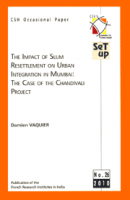[CSH-CPR Urban Workshop] THE CITY WITHOUT THE CITY (S. Benkimoun & H. Ribadeau Dumas)
The Centre de Sciences Humaines (CSH) & Centre for Policy Research (CPR)
are pleased to invite you to a Digital Urban Workshop (n°153)
by
Samuel BENKIMOUN
Hugo RIBADEAU DUMAS
on
THE CITY WITHOUT THE CITY?
Anatomy of urban voids in Delhi metropolitan region

Tuesday, 29 November 2022, at 3:45 pm IST onwards on
About talk: Is Delhi getting emptied out? The question may appear incongruous: the National Capital Region (NCR) is one of the world’s fastest-growing metropolises. In fact, Delhiites have the tendency to rationalize their daily struggles on account of “overpopulation”. However, as we contend in this article, urban voids play a tremendous role in shaping the city and its ethos.
The study describes how a collective disengagement from the larger urban space has generated spatial discontinuities across Delhi NCR. This phenomenon has transformed certain parts of the city into an urban archipelago – which we are tempted to call tukde tukde town. The trail of this growth model leaves holes in the urban fabric: in the interstices separating the different fragments of the city, different types of urban voids emerge. These voids include, for instance, spaces around walled colonies, spots below flyovers, or stretches alongside urban roadways.
These voids are not forgotten, nor are they waiting to be developed – they are often designed as such, to remain empty. Contrasting with traditional views framing emptiness as a temporary, incomplete stage of urban development, this article argues that urban voids may constitute the ultimate outcome of the production of space in contemporary Delhi NCR – as well as a powerful tool of governance. By interrogating the nature, role, and meaning of emptiness in Delhi, this study raises crucial questions related to contemporary urban practices and imaginaries in India. It also participates in decentring theorization on urbanity beyond the so-called North-South divide.
About Speakers:
Samuel Benkimoun is a Ph.D. scholar in Geography at Université Paris 1 Panthéon-Sorbonne (Paris, France), under Dr. Eric Denis and Dr. Olivier Telle, and is part of the Géographie-Cités research unit. His research interests focus on urban geography, health issues, spatial analysis and digital humanities. His Ph.D. dissertation investigates the potential linkages between the spread of infectious diseases and urban dynamics with a special focus on people’s mobility, urban sprawl, and social disparities in Delhi. As a member of the Centre de Sciences Humaines (CSH), Delhi, he was also involved in the Challenging Inequalities (CHALLINEQ) multidisciplinary project as a data analyst.
Hugo Ribadeau Dumas is a Ph.D. scholar affiliated to the Ecole des Hautes Etudes en Sciences Sociales (EHESS, Paris). He is currently based at the Centre de Sciences Humaines (CSH), in New Delhi. His research work focuses on cities, gender and friendship in India. His current fieldworks are located in Bihar and Goa. Hugo worked in the past for PRIA, the Aga Khan Foundation, the Agence Française de Développement (AFD), Altai Consulting and KPMG, across India, Bangladesh and Afghanistan.
This is the hundred and fifty-three (153) in a series of Urban Workshops planned by the Centre de Sciences Humaines (CSH), New Delhi and Centre for Policy Research (CPR). These workshops seek to provoke public discussion on issues relating to the development of the city and try to address all its facets including its administration, culture, economy, society and politics. For further information, please contact: Stéphanie Tawa Lama of CSH at tawalama@ehess.fr, Mukta Naik at mukta@cprindia.org or Marie-Hélène Zerah at marie-helene.zerah@ird.fr








